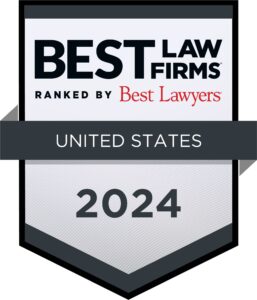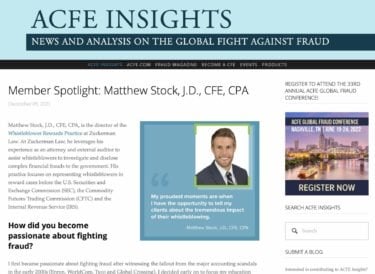
Auditor Independence Whistleblower Lawyers

The Rule provides a nonexclusive list of specific circumstances that render an accountant nonindependent. This includes circumstances that:
- create a mutual or conflicting interest between the auditor and the client;
- place the auditor in the position of auditing his or her own work;
- result in the auditor’s acting as management or an employee of the client; or
- place the auditor in a position of being an advocate for the client.
Typically, independence cases arise from inappropriate financial or employment relationships between an auditor and a client. Recently, however, the SEC has targeted independence violations that stem from “inappropriate close personal relationships” between auditors and clients, including romantic relationships and excessive socializing.
Contact us today for a free, confidential consultation. to find out the strategies that we have successfully employed to secure SEC whistleblower awards for our whistleblower clients.






Purpose of Auditor Independence Rules
The independence rules are designed to ensure that auditors perform their work in an objective and impartial manner. By remaining independent in fact and appearance, auditors improve the reliability of information used for investment and credit decisions and strengthen public confidence in the financial markets.
As summarized in a motion filed in a case brought against Prager Metis, “Independence is a key principle of public accounting. Dating back to the inception of the securities laws, the Commission emphasized the need for auditors to be independent, including by avoiding contractual alliances with their public audit clients.”
SEC Enforcement Actions for Violations of Auditor Independence
In a speech, former SEC Enforcement Director Andrew Ceresney stressed that auditor independence “is an area of significant importance to the Commission.” He noted that in the past few years, the SEC has brought independence-related cases involving:
- the provision of bookkeeping and expert services to affiliates of audit clients (i.e., audit firms cannot loan their staff to audit clients in a manner that results in the staff’s acting as employees of those companies);
- audit personnel’s owning stock in audit clients or affiliates of audit clients (KPMG agreed to pay $8.2 million to settle the SEC’s charges);
- lobbying on behalf of audit clients (Ernst & Young (“EY”) agreed to pay more than $4 million to settle the charges);
- service by audit-firm employees or affiliates on boards of audit clients (Deloitte agreed to pay more than $1 million to settle the charges);
- preparation of financial statements of brokerage firms that were also audit clients (SEC sanctioned 8 audit firms for preparing the financial statements of brokerage firms that were their audit clients); and
- circumvention of the lead-audit-partner-rotation requirements (the lead partner is prohibited from performing lead-audit-partner services for the same issuer for more than 5 consecutive fiscal years).
In addition, the SEC has stepped up enforcement actions against inappropriately close personal relationships between auditors and clients.
PwC Paid $7.9 Million for Violating Auditor Independence Rules
On September 23, 2019, the SEC announced that PwC paid $7.9 million to settle charges of improper professional conduct in connection with 19 engagements on behalf of 15 SEC-registered issuers and violating auditor independence rules. The SEC found that “PwC violated the SEC’s auditor independence rules by performing prohibited non-audit services during an audit engagement, including exercising decision-making authority in the design and implementation of software relating to an audit client’s financial reporting, and engaging in management functions.”
“Close Personal Relationships” Lead to Violations of Independence Rules
In an SEC enforcement action, EY, a public accounting firm, agreed to pay $9.3 million to settle charges that two of the firm’s audit partners violated independence rules by getting too close to their clients on a personal level.
The SEC’s first complaint alleges that EY audit partner Gregory Bednar maintained an inappropriately close personal relationship with the chief financial officer (“CFO”) of an EY audit client. The relationship consisted of frequently attending social events together, exchanging gifts, and even taking numerous overnight, out-of-town trips together. The complaint notes that Bednar:
- gifted sports tickets to the CFO, the CFO’s family, or friends of the CFO’s son for use when Bednar was not present;
- took trips with the CFO;
- stayed at the CFO’s vacation home in Hilton Head, South Carolina;
- exchanged hundreds of personal texts, emails, and voicemails with the CFO that did not include meaningful business-related discussion; and
- incurred significant entertainment, travel, and lodging expenses while entertaining the CFO and his family.
The SEC found that the extent and nature of their socializing impaired the audit partner’s independence under Regulation S-X.
The SEC’s second complaint alleges that EY audit partner Pamela Hartford had a romantic relationship with Robert Brehl, the Chief Accounting Officer (“CAO”) of an EY audit client. The main EY partner on the audit engagement, Michael Kamienski, was aware of facts that indicated a possible romantic relationship between Hartford and the CAO. Despite this, Kamienski failed to identify those facts as red flags, failed to perform a reasonable inquiry regarding the extent of the relationship, and failed to raise concerns to EY’s U.S. Independence group.
The SEC brought charges against EY, Hartford, Kamienski, and Brehl. By including Kamienski in the action, the SEC underscored that auditors will not be able to avoid liability by burying their heads in the sand.
Recently, Zuckerman Law was quoted in a Compliance Week article titled “Audit committees need to dig into personal relationships,” which covered this enforcement action. Matthew Stock, former external auditor and current associate at Zuckerman Law, highlighted the impact that independence violations can have on external audit firms and issuers. In addition, he noted that audit committees must judge the significance of these relationships through the lens of whether a reasonable investor would consider them important when making investment decisions.
Primary Audit Deficiencies Identified in PCAOB Audit
Based on 780 issuer audits in 2016, the PCAOB identified the following audit deficiencies in a staff inspection brief:
- Assessing and responding to risks of material misstatement, including the fraud risk involving improper revenue recognition and the types of revenue, revenue transactions, or assertions that may give rise to such risks.
- Auditing internal controls over financial reporting, including “insufficient testing of the design and operating effectiveness of selected controls, particularly those controls that include a review element. Many of these deficiencies involved testing controls over management’s cash-flow forecasts or other assumptions that the issuer used in determining estimates related to revenue, business combinations, asset impairments, and reserves.”
- Auditing accounting estimates, including fair value measurements. “Audit deficiencies in this area have commonly related to evaluating impairment analyses for goodwill and other long-lived assets and the valuations of assets and liabilities acquired in business combinations. Other areas where deficiencies were identified include revenue-related estimates and reserves, the allowance for loan losses (“ALL”), inventory reserves, and financial instruments.”
Dodd-Frank SEC Whistleblower Reward Program

Qualifying for an SEC Whistleblower Award

If you have information that may qualify for an SEC whistleblower award, contact the Director of our SEC whistleblower practice at [email protected] or call our leading SEC whistleblower lawyers at (202) 930-5901 or (202) 262-8959. All inquiries are confidential. In conjunction with our courageous clients, we have helped the SEC halt multi-million dollar investment schemes, expose violations at large publicly traded companies and return funds to defrauded investors. Click below to hear SEC whistleblower lawyer Matt Stock’s tips for SEC whistleblowers:
Whistleblower Protections for Corporate Whistleblowers
The SEC Whistleblower Program also protects the confidentiality of whistleblowers. Furthermore, the Dodd-Frank Act protects whistleblowers from retaliation by their employers for reporting violations of securities laws.
In addition, the Sarbanes-Oxley Act provides robust protection for corporate whistleblowers. For information about the Sarbanes-Oxley whistleblower protection law, download our free guide titled Sarbanes-Oxley Whistleblower Protection: Robust Protection for Corporate Whistleblowers.
Tips to Successfully Navigate the SEC Whistleblower Process
SEC Whistleblower Lawyers

For more information about whistleblower rewards and bounties, contact the SEC whistleblower lawyers at Zuckerman Law at 202-930-5901 or 202-262-8959.
In contrast to most SEC whistleblower practices, our team includes a Certified Public Accountant and Certified Fraud Examiner with substantial experience auditing public companies and investigating complex fraud schemes. And two lawyers on our team served in senior positions at the U.S. Office of Special Counsel overseeing government investigations of whistleblower claims. We understand the many challenges that the SEC faces in investigating our clients’ disclosures and take measures to increase the likelihood that the SEC will be able to effectively pursue the disclosures we provide on behalf of our clients.
- Matt Stock is a Certified Public Accountant, Certified Fraud Examiner and former KPMG external auditor. As an auditor, Mr. Stock developed an expertise in financial statement analysis and internal controls testing and fraud recognition. He uses his auditing experience to help IRS, CFTC and SEC whistleblowers investigate and disclose complex financial frauds to the government and develop a roadmap for enforcement attorneys to take an enforcement action. Matt has been interviewed on CNBC, quoted extensively about whistleblower rewards in the media, and is the lead author of SEC Whistleblower Program: Tips from SEC Whistleblower Attorneys to Maximize an SEC Whistleblower Award. Recently the Association of Certified Fraud Examiners published a profile of Matt Stock’s success fighting fraud:






Auditor Independence Principles
In a brief filed in an audit independence enforcement action against Prager Metis for audit independence violations in connection with its audits of FTX, the SEC summarizes key principles of audit independence:
- Independence is a key principle of public accounting. Dating back to the inception of the securities laws, the Commission emphasized the need for auditors to be independent, including by avoiding contractual alliances with their public audit clients. See In the Matter of Am. Terminals and Transit Co., 1 S.E.C. 701, 1936 WL 32788 *6 (September 29, 1936) (protection of investors requires that independent auditors “be free of the entangling alliances which relational and contractual connections with registrants frequently engender, but also that they approach their task with complete objectivity—critical of the practices and procedures of registrants . . . .”).
The Supreme Court confirmed the Commission’s views and described independent public accountants as a “public watchdog” that must maintain total independence from the client at all times and complete fidelity to the public trust. Arthur Young & Co., 465 U.S. at 818 (public faith in the reliability of a corporation’s financial statements depends upon the public perception of the outside auditor as an independent professional). - Commission Rule 2-01 of Regulation S-X “is designed to ensure that auditors are qualified and independent of their audit clients both in fact and in appearance.” 17 C.F.R. § 210.2-01 (emphasis added). Rule 2-01(b) provides the general standard of auditor independence that: The Commission will not recognize an accountant as independent, with respect to an audit client, if the accountant is not, or a reasonable investor with knowledge of all relevant facts and circumstances would conclude that the accountant is not, capable of exercising objective and impartial judgment on all issues encompassed within the accountant’s engagement. In determining whether an accountant is independent, the Commission will consider all relevant circumstances, including all relationships between the accountant and the audit client, and not just those relating to reports filed with the Commission. 17 C.F.R. § 210.2-01(b).
- Engagement letters are not mere ordinary contracts for services. Audit engagement letters are themselves subject to prescribed audit standards. See PCAOB Auditing Standard (“AS”) 1301, Communications with Audit Committees, which, among other things, requires the auditor to communicate to the client’s audit committee the responsibilities of the auditor in relation to the audit and establish an understanding of the terms of the audit engagement with the audit committee . . . The engagement letter encapsulates a list of the responsibilities of both the auditor and management, and also refers to the professional standards by which the engagement will be governed and may also describe any limitations of the services being provided.
- Indemnification provisions between an auditing firm and its client create the very type of situation which lead to the appearance of a conflict of interest9 and lack of independence, regardless whether the indemnification provision was ever invoked.10 As the Commission has publicly explained, “if investorIn Commission enforcement actions, a finding of actual impairment or impairment in facts do not believe that an auditor is independent of a company, they will derive little confidence from the auditor’s opinion and will be far less likely to invest in that public company’s securities.” Revision of the Commission’s Auditor Independence Requirements, 2000 WL 1726933, at *2 (Nov. 21, 2000) (“Adopting Release”).
- In Commission enforcement actions, a finding of actual impairment or impairment in fact has not been required to allege a lack of auditor independence. One such example is found in In the Matter of Ernst & Young LLP et al. (“EY”), 2016 WL 4983302 (Sept. 19, 2016), a settled administrative and cease-and-desist proceeding. The EY matter was based on allegations under the general standard of independence that an auditing firm’s employee and member of the audit engagement team had a close personal relationship with the chief accounting officer at the audit client, which created the appearance of a violation of independence between auditor and client. Additionally, the prohibition of a close personal relationship with the audit client is not specifically identified in the non-exclusive circumstances that are inconsistent with independence in Rule 2-01(c) of Regulation S-X [17 C.F.R. § 210.2-01(c)] (“Rule 2-01(c)”); however, it is well understood that this is the type of relationship that would impair independence. The Commission has brought other cases based on alleged violations of the Commission’s independence rule for actions not specifically identified in Rule 2-01(c). See In the Matter of Ernst & Young LLP, 2021 WL 3410672 (Aug. 2, 2021) (settled order in administrative and cease-and-desist proceeding against auditing firm and its partners alleging independence violations related to competitive bid process); In the Matter of Ernst & Young LLP, 2014 WL 3401161 (July 14, 2014) (settled order in administrative and cease-and-desist proceeding against auditing firm alleging auditing firm improperly advocated for an audit client in violation of the Commission’s independence rules.).





